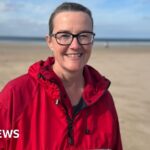Health
EU renews support for WHO’s Universal Health Coverage Partnership
Read more on post.
The World Health Organization (WHO) and the European Union (EU) have renewed their collaboration on achieving universal health coverage with the launch of Phase V (2025–2028) of the Universal Health Coverage (UHC) Partnership – WHO’s largest platform for strengthening health systems and advancing primary health care. The announcement was made today by the European Commissioner for International Partnerships, Jozef Síkela and WHO Director-General, Dr Tedros Adhanom Ghebreyesus on the sidelines of the 80th UN General Assembly in New York City.
With a new EU financial support of €40 million and an additional contribution foreseen in 2027, the EU and WHO will focus through this Phase V on building resilient, equitable, and people-centred health systems – key to achieving the health-related Sustainable Development Goals (SDGs). The EU is a founding and leading donor to the UHC Partnership, enabling WHO to provide long-term, in-country technical support aligned with national health priorities.
Since its inception in 2011, the WHO UHC Partnership has supported health ministries in implementing inclusive reforms, and has contributed to improved governance, service delivery, health financing and response to health emergencies in over 115 countries. Through this initiative, the EU and WHO have enabled measurable improvements in service coverage and health system performance, reaching more than 3 billion people worldwide.
With this new EU contribution, WHO will focus on countries where its support is most needed in addressing critical gaps in health systems. The partnership will play a key role in promoting the implementation of the Lusaka Agenda and in driving increased domestic resource mobilization. It will also help countries in implementing the new vision for the prevention and control of noncommunicable diseases (NCDs), mental health and well-being to be considered by the High-Level Meeting at the United Nations General Assembly on 25 September.
Commissioner for International Partnerships Jozef Síkela said: “Strong health systems are the cornerstone of sustainable development, resilience, and global stability. This is why investing in their strengthening is a central pillar of the EU’s Global Gateway strategy. Working together with WHO to achieve universal health coverage, and supporting local manufacturing, regulatory frameworks and skills, the EU affirms its commitment to ensuring that all people can access quality health services, when and where they need them, without facing financial hardship.”
“Achieving health for all requires partnership among all, and the renewed collaboration between the European Union and WHO to advance universal health coverage will help millions of people around the world access the quality health services they need,” said Dr Tedros Adhanom Ghebreyesus, WHO Director-General. “Together, WHO and the EU are translating global health commitments for strong health systems and universal health coverage into national action – ensuring no one is left behind.”
Phase V comes at a critical time, as countries face climate change, economic instability challenges and reduced development assistance. The EU’s commitment reinforces its role as a global health leader and partner in advancing UHC through a primary health care approach.
Key priorities for Phase V include:
- strengthening health financing, governance, reforms and policy dialogue for self-reliant health systems;
- strategic planning, evidence-informed priority setting and health systems assessment to improve health sector performance;
- ensuring integrated, high quality, affordable service delivery, including sexual and reproductive health and noncommunicable disease services, through a PHC approach; and
- promoting equity, gender equality, and climate resilience.
The initiative aligns with the EU Global Health Strategy and WHO’s 14th General Programme of Work (GPW14), reflecting a shared vision of health for all. The EU is committed to supporting countries in developing resilient, equitable, and sustainable health systems.
Health
Minister visits HSE’s Social Inclusion services in Waterford
Read more on post.
HSE Dublin and South East Media Release
24 September, 2025
The HSE’s Primary Care/Social Inclusion services in Waterford were delighted to host the Minister of State at the Department of Health with special responsibility for Public Health, Wellbeing and the National Drugs Strategy Jennifer Murnane O’ Connor T.D. on a visit to their offices at St. Otteran’s Hospital.
An overview was provided for the Minister on the services available in such spheres as Addiction (including HSE community agencies supported by the HSE under Section 39 of the Health Act), Homeless services, Traveller Health, Migrant Health, Family Support and work with the Roma community.
Having been welcomed by Lisa Robson (General Manager/Social Inclusion) of the Primary Care Services for the Waterford/Wexford and Carlow-Kilkenny/Tipperary South Integrated Healthcare Areas of the HSE’s Dublin and South East region, Minister Murnane O’ Connor heard from various team members as to the supports it provides locally.
In partnership with other agencies the HSE’s Primary Care/Social Inclusion service supports the development and implementation of initiatives that enhance health care delivery to improve access and ensure equitable health outcomes for vulnerable groups. This is towards ensuring that health outcomes for socially excluded groups in society are improved.
In terms of working for equitable health outcomes for vulnerable groups, the HSE’s Social Inclusion services are working with Refugees, Asylum Seekers who are now recognised as People Seeking International Protection, Beneficiaries of Temporary Protection, Roma, Travellers and LGBT+ people and their families, those with Addictions and those who experience or who are at risk of Homelessness.
HSE Social inclusion works in partnership with the community and voluntary sectors and across a range of statutory services, to improve access to health services for disadvantaged groups. This includes provision of targeted interventions for people from marginalised groups who experience health inequalities, have difficulties accessing services and present with multiple, complex health and support needs (including health supports for people who are homeless and in relation to domestic, sexual and gender-based violence).
The HSE’s Substance Misuse services comprise of range of free and confidential services in Waterford City and County. This service is for anyone affected by problematic drugs or alcohol misuse and can be accessed by individuals regardless of what stage they are at, across the spectrum of addiction. The Substance Misuse recovery team in Waterford comprises of: GPs, an Assistant Director of Nursing, Substance Misuse Liaison Nurses, a Drug and an Alcohol Liaison Midwife, a Senior Counsellor, Addiction Counsellors, Community based Drug and Alcohol workers, Outreach Workers, Drugs Education Officer, local Substance Misuse Co-ordinators and a Clinical Lead. The team also work with the HSE’s Primary Care services, GPs and community pharmacies in providing a patient centred approach.
Last updated on: 24 / 09 / 2025
Health
Minister visits HSE’s Health and Wellbeing Hub in Waterford
Read more on post.
The Minister of State at the Department of Health with special responsibility for Public Health, Wellbeing and the National Drugs Strategy Jennifer Murnane O’ Connor T.D. was in Waterford to visit the HSE’s Health and Wellbeing Hub, located in the former St. Martin’s School, Kilcohan.
It was an opportunity for the Minister to meet and greet community delivery partners and health and wellbeing teams who provide integrated service delivery, supporting the vision of the Sláintecare strategy.
Among the groups with whom Minister Murnane O’ Connor chatted during her visit were:
- The Waterford Sláintecare Healthy Communities programme, including representatives of the HSE, Waterford City and County Council and community partners.
- The HSE’s Health Promotion and Improvement Team and workers in the Healthy Childhood Programme (Breastfeeding Initiatives in Waterford).
- The Waterford Vaccination Centre Team (who administer the RSV, Flu and COVID-19 booster vaccines at their Centre in Kilcohan).
- The HSE’s national Healthy Living and Active Living (HEAL) team and the HSE’s National Alcohol programme team, members of each being based in the Kilcohan centre.
The Health and Wellbeing Hub in Kilcohan is a regional demonstration site for integrated prevention and early intervention and delivers practical, community-based supports aligned to Sláintecare.
Welcoming Minister Murnane O’ Connor to the Hub, Kate Cassidy (General Manager, Health and Wellbeing, HSE) said:
“We were pleased that we got to update the Minister on our current activity, which includes the Healthy Food Made Easy (HFME) initiative, our smoking cessation service (including the Quit and Stay Quit during Pregnancy programme), breastfeeding-friendly initiatives and peer support, chronic disease prevention and self-management supports and alcohol harm-reduction.”
“Through close collaboration with community partners (the local authority, Family Resource Centres, Traveller Health Project, the local Sports Partnership and SETU), the Hub reduces barriers to access, addresses local health inequalities and maximises shared facilities, workforce and data-informed planning. It also supports the ongoing transition to regional health areas such as the HSE Dublin and South East health region structure, by modelling joined-up governance, shared infrastructure and co-ordinated pathways across community and clinical services.”
“Another important feature of the HSE’s work at Kilcohan that the Minister was able to see fist-hand was the integrated vaccination service – regarding Flu, COVID-19, Respiratory Syncytial Virus (RSV), school based Live Attenuated Influenza Vaccine (LAIV – nasal application for those aged 2-17 years) outreach to long term care facilities and those housebound.”
Last updated on: 24 / 09 / 2025
Health
WHO statement on autism-related issues
Read more on post.
The World Health Organization (WHO) emphasizes that there is currently no conclusive scientific evidence confirming a possible link between autism and use of acetaminophen (also known as paracetamol) during pregnancy.
Globally, nearly 62 million people (1 in 127) have autism spectrum disorder, a diverse group of conditions related to development of the brain. Although awareness and diagnosis have improved in recent years, the exact causes of autism have not been established, and it is understood there are multiple factors that can be involved.
Extensive research has been undertaken over the past decade, including large-scale studies, looking into links between acetaminophen use during pregnancy and autism. At this time, no consistent association has been established.
WHO recommends that all women continue to follow advice of their doctors or health workers, who can help assess individual circumstances and recommend necessary medicines. Any medicine should be used with caution during pregnancy, especially in the first three months, and in line with advice from health professionals.
Also, a robust, extensive evidence base exists showing childhood vaccines do not cause autism. Large, high-quality studies from many countries have all reached the same conclusion. Original studies suggesting a link were flawed and have been discredited. Since 1999, independent experts advising WHO have repeatedly confirmed that vaccines—including those with thiomersal or aluminum—do not cause autism or other developmental disorders.
Childhood vaccine schedules are developed through a careful, extensive and evidence-based process involving global experts and country input. The childhood immunization schedule, carefully guided by WHO, has been adopted by all countries, and has saved at least 154 million lives over the past 50 years. The schedule remains essential for the health and wellbeing of every child and every community. These schedules have continually evolved with science and now safeguard children, adolescents and adults against 30 infectious diseases.
Every vaccine recommendation by the Strategic Advisory Group of Experts on Immunization (SAGE), an independent advisory group to WHO, is grounded in rigorous review of evidence and carefully designed to offer the best protection against serious diseases and to be delivered when most needed.
When immunization schedules are delayed or disrupted, or altered without evidence review, there is a sharp increase in the risk of infection not only for the child, but also for the wider community. Infants too young to be vaccinated and people with weakened immune systems or underlying health conditions are at greatest risk.
Autism and neurodevelopmental disorders are among priority mental health and neurological conditions being discussed at the 4th UN High-Level Meeting on NCDs and mental health this Thursday, 25 September. As a global community, we need to do more to understand the causes of autism and how best to care for and support the needs of autistic people and their families.
WHO is committed to advancing this goal working together with partners including autistic-led organizations and other organizations representing persons with lived experience. WHO also stands with people who are living with autism and their families, a dignified community entitled to evidence-based considerations free of stigma.
-
Breaking News1 day ago
Barack Obama to be conferred with freedom of Dublin at ceremony on Thursday
-
Breaking News1 day ago
Opinion: To be or not to be? Why it is time to drop Shakespeare’s compulsory status in Leaving Cert
-
Culture1 day ago
Taylor Swift’s new cinema outing generates more than €12million in just 24 hours
-
Breaking News1 day ago
Minister rejects proposal to make Shakespeare optional in Leaving Cert English
-
Breaking News1 day ago
Families at risk of homelessness may have another chance to avail of tenant-in-situ scheme
-
Culture1 day ago
Milan Fashion Week 2025: Unmissable shows and Giorgio Armani in mind
-
Travel & Lifestyle2 days ago
The Best Way to See Rome? On a Running Tour at Sunrise
-
Politics1 day ago
European Parliament snubs Orbán with vote to shield Italian MEP from Hungarian arrest





































